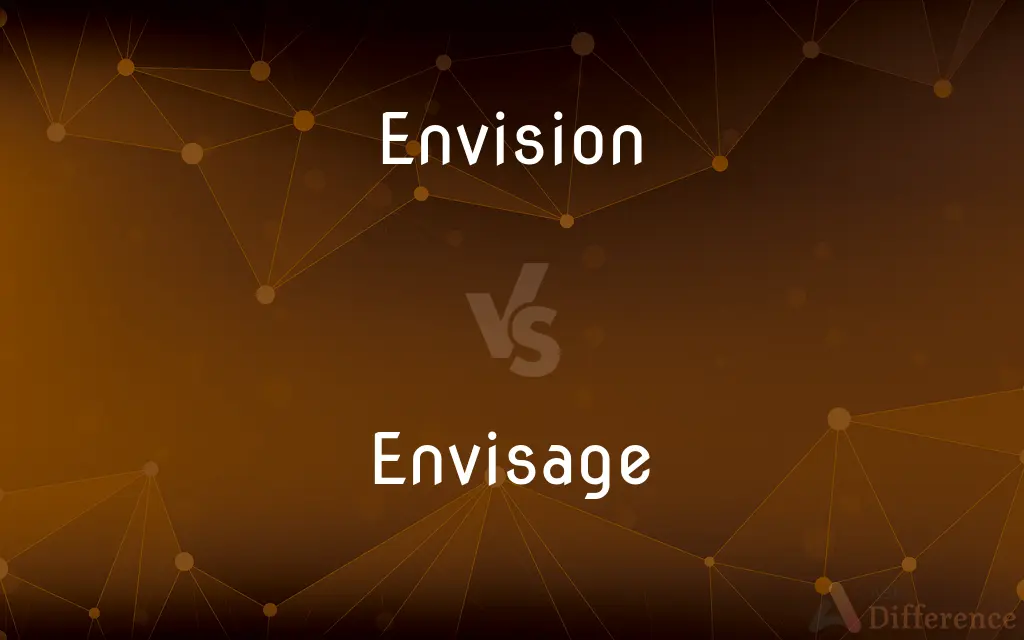Envision vs. Envisage — What's the Difference?
Edited by Tayyaba Rehman — By Urooj Arif — Updated on March 7, 2024
Envision implies picturing a concept or future clearly, while envisage focuses on contemplating or considering possibilities.

Difference Between Envision and Envisage
Table of Contents
ADVERTISEMENT
Key Differences
Envision often involves imagining something in detail or picturing it in the mind with clarity, typically associated with future plans or goals. On the other hand, envisage can be more about considering or contemplating possibilities, not always with the same level of detail as envision.
While envisioning is commonly used in the context of planning and goal setting, often with a sense of optimism and intention, envisage might be used in a broader context, including foreseeing challenges or considering various outcomes.
Envision implies a more focused and detailed imagination of future events or achievements, suggesting a clearer picture or plan. Envisage, while similar, might imply a less detailed and more general consideration of future possibilities or scenarios.
The term envision tends to be more common in American English, often used in motivational or aspirational contexts. Envisage, while understood in American English, is more commonly used in British English and might be considered slightly more formal or literary.
Both terms imply forward-thinking, but envision is often associated with personal vision or goals, suggesting a more individual and detailed projection. Envisage might encompass a broader range of considerations, including potential obstacles or alternative outcomes, not solely focused on personal goals.
ADVERTISEMENT
Comparison Chart
Definition
To picture something in the mind with clarity
To contemplate or consider possibilities
Usage Context
Often used in planning and goal setting
Used in broader contemplation of outcomes
Detail Level
Implies a clear, detailed imagination
Might imply a less detailed consideration
Commonality
More common in American English
More common in British English
Connotation
Often aspirational and optimistic
Can be neutral, considering various outcomes
Compare with Definitions
Envision
To picture something in one's mind, especially the future.
She envisions a bright future for her company.
Envisage
To contemplate or consider a possible future event.
The law envisages scenarios where intervention is necessary.
Envision
To dream of or imagine something in detail.
He envisions living in a peaceful countryside.
Envisage
To form a mental image of something; imagine.
She envisaged the outcome with some apprehension.
Envision
To forecast or predict something as likely to happen.
The report envisions a significant rise in sea levels.
Envisage
To view or regard in a certain way.
The strategy envisages a key role for community involvement.
Envision
To imagine as a future possibility; visualize.
They envision the project completed by next year.
Envisage
To foresee or predict as a possibility.
The plan envisages various challenges along the way.
Envision
To conceive of as a possibility or a desirable future event.
The architect envisions a new kind of urban space.
Envisage
To consider or think of something in a particular way.
The author envisages a future dominated by technology.
Envision
To picture in the mind; imagine.
Envisage
Contemplate or conceive of as a possibility or a desirable future event
The Rome Treaty envisaged free movement across frontiers
Envision
(transitive) To conceive or see something within one's mind. To imagine.
Envisage
To conceive an image or a picture of, especially as a future possibility
Envisaged a world at peace.
Envision
Imagine; conceive of; see in one's mind;
I can't see him on horseback!
I can see what will happen
I can see a risk in this strategy
Envisage
To consider or regard in a certain way.
Envision
Picture to oneself; imagine possible;
I cannot envision him as President
Envisage
To conceive or see something within one's mind; to imagine or envision.
Envisage
To look in the face of; to apprehend; to regard.
From the very dawn of existence the infant must envisage self, and body acting on self.
Envisage
Form a mental image of something that is not present or that is not the case;
Can you conceive of him as the president?
Common Curiosities
Can both terms be used in a business context?
Yes, both can be used in business to discuss future plans, goals, or considerations, though "envision" might be more common when detailing specific aspirations or visions.
Do they have the same origins?
Both terms have roots in visual imagery (from French 'envisager' and 'en vision'), but they have evolved to carry slightly different nuances in English.
Is one more formal than the other?
Envisage might be considered slightly more formal or literary, especially in British English, while envision is widely used in both formal and informal contexts in American English.
Is envision more about creating detailed mental images?
Yes, envision often implies creating a detailed mental picture or imagining a specific scenario or future possibility.
How do the terms relate to goal setting?
"Envision" is often used in the context of setting clear, detailed goals, while "envisage" might be used when considering a range of possible outcomes or challenges in achieving a goal.
Can both terms apply to problem-solving?
Yes, both can apply; one might envisage potential challenges or outcomes and envision detailed solutions or approaches.
Is there a difference in their usage in American and British English?
Envision tends to be more commonly used in American English, while envisage is more frequently found in British English, though both terms are understood in both variants.
Are envision and envisage interchangeable?
While similar and often used interchangeably, "envision" implies a clearer, more detailed imagining, often with a positive connotation, whereas "envisage" can be more neutral and broad.
Can envision and envisage be used interchangeably?
While they are similar and often used interchangeably, subtle differences in connotation can make envision more about detailed imagining and envisage more about general foreseeing.
What is the basic difference between envision and envisage?
Envision involves imagining something as a future possibility, while envisage may include considering or foreseeing something as a likely outcome.
Does envisage relate more to foreseeing possibilities?
Yes, envisage is more about contemplating or foreseeing possible future scenarios or outcomes, often in a broader sense.
Are there professions where one term is more commonly used than the other?
In professions involving detailed planning and design, such as architecture or software development, envision might be more commonly used, while envisage might be more common in strategic planning or consultancy.
Are there contexts where one is preferred over the other?
Envision is more commonly used in creative or detailed future planning contexts, while envisage is often preferred in discussing broader or less detailed future possibilities.
How do envision and envisage relate to creativity?
Envisioning is closely associated with the creative process, involving detailed imagining, while envisaging can also involve creativity but in a broader, less detailed sense.
How do envision and envisage relate to goal setting?
Envisioning is often related to setting specific, detailed goals, whereas envisaging might involve considering broader objectives or outcomes.
Share Your Discovery

Previous Comparison
Exuberant vs. Exorbitant
Next Comparison
Perk vs. PerqAuthor Spotlight
Written by
Urooj ArifUrooj is a skilled content writer at Ask Difference, known for her exceptional ability to simplify complex topics into engaging and informative content. With a passion for research and a flair for clear, concise writing, she consistently delivers articles that resonate with our diverse audience.
Edited by
Tayyaba RehmanTayyaba Rehman is a distinguished writer, currently serving as a primary contributor to askdifference.com. As a researcher in semantics and etymology, Tayyaba's passion for the complexity of languages and their distinctions has found a perfect home on the platform. Tayyaba delves into the intricacies of language, distinguishing between commonly confused words and phrases, thereby providing clarity for readers worldwide.














































